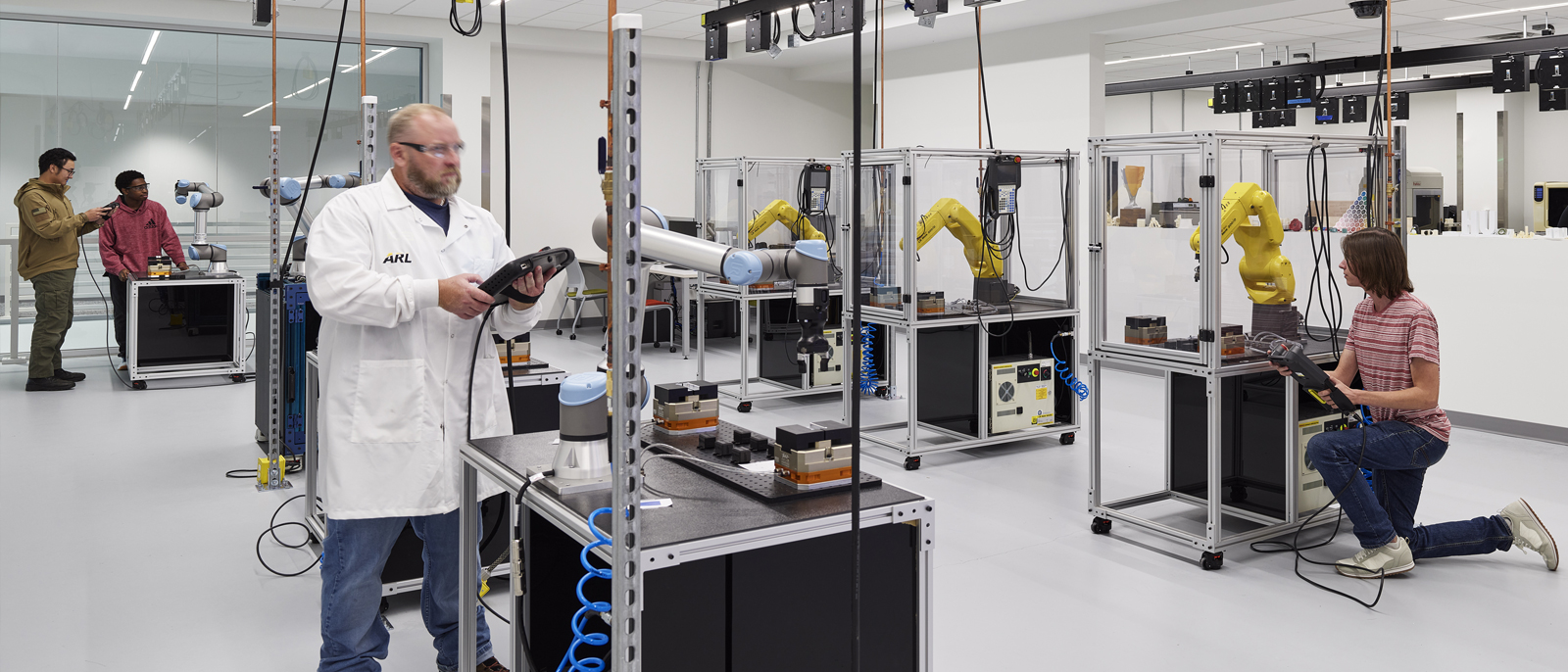Bachelor of ScienceAdvanced Manufacturing
This Bachelor of Science program is centered in robotics and on hands-on activities which provide a practical understanding of processes, equipment, software, and materials in manufacturing.
Apply Now Request Info
Advanced Manufacturing (ADMA) is the integration of manufacturing with robotic and digital technologies which enables the development and/or modification of new and existing parts/products/materials. This integration (currently slated as Industry 4.0 but moving towards Industry 5.0) allows for improvements in manufacturing processes with the use of state-of-the-art software and hardware tools that foster investigation, discovery, design, engineering, and development for those interested in robotics.
The core focus areas in ADMA are:
- Robotics and Automation
- Design and Simulation
- the Manufacturing Process
The ADMA Undergraduate Program here at HU offers a Bachelor of Science degree and teaches theory and practical applications. Some hands-on activities provided in the curriculum include machine & computer programming, materials testing & characterization, and product development & prototyping. The major thrust of the ADMA program and facilities is the creation of an educational environment that provides for the rapid transfer and infusion of science and technology into manufacturing products and processes.
In order to achieve and reinforce the program goals (listed below), the following capabilities are provided at HU: Robotics & Automation, Additive Manufacturing (3D Printing), Subtractive Manufacturing (Machining), CAD/CAM & Simulation, Metal Working, Composites Fabrication, Polymer Processing, Materials Testing & Finishing, Electronics & PLC Programming, Factory Design & Programming in a CIM/FMS environment, Augmented & Virtual Reality, and various software solutions which connect these technologies to the manufacturing floor.
Program Goals
Graduates of the Advanced Manufacturing program are able to:
- Produce simple and complex solutions to issues in manufacturing.
- Communicate research-based information in oral and written formats to both advanced manufacturers and non-manufacturers.
- Collect and analyze data gathered from industry and industrial-related issues.
- Evaluate the ability to analyze metallic and nonmetallic materials needed to produce prototypes and advanced manufacturing solutions.
- Create solutions that support global awareness and ethical decision-making when resolving issues
As part of the Advanced Manufacturing program, the student completes a professional portfolio as a means for assessing learning outcomes and enhancing personal and professional development.
Program Courses
This program requires a total of 47 semester hours. The semester hour value of each course appears in parentheses ( ).
ADMA 115 –
Introduction to Computers & Research in Manufacturing
(3 credits)
This course provides fundamental computer literacy skills for manufacturing students in a MS Windows environment. Productivity software applications such as Word, Excel, OneNote, Teams, and PowerPoint are utilized with an emphasis on manipulating data for personal and professional communication. These applications will be directed towards computer mathematics, engineering economy calculations, and preliminary research techniques.
ADMA 135 –
Manufacturing Technology & Society
(2 credits)
Manufacturing Technology and Society is an overview of the development and design of technical systems in society, their impact throughout history, and procedures for making choices of appropriate technology to apply currently and in the future, based on global awareness and strong moral and ethical standards. Topics of discussion will include the agricultural revolution, industrial revolution, information revolution and the forces that brought them into existence and their downfalls. Lab activities and possibly visitations utilized to reinforce concepts.
ADMA 160 –
Metallic Materials & Manufacturing Processes
(3 credits)
This course uses the various tools and techniques for processing metallic materials as a vehicle for developing a solid foundation for the hands-on manufacturing activities and industrial safety fundamentals used throughout the Advanced Manufacturing curriculum. Concepts introduced include precision measurement and layout, material properties and handling, and the use of various hand tools and machinery used in metal fabrication. Completion of OSHA-approved safety training and consistent demonstration of safe and responsible operation of lab equipment is a required part of this coursework.
ADMA 230 –
Appld Analog & Digital Electronics
(3 credits)
This course is an introduction to analog and digital electronics as it relates to advanced manufacturing through hands-on activities centered around building and logically troubleshooting circuits and devices. The concepts and theories will be covered in an industrial and or an advanced manufacturing setting. Use of instrumentation will be stressed with the application of problem-solving techniques.
ADMA 240 –
Computer-Aided Design and Drafting
(3 credits)
The Computer-Aided Design (CAD) course introduces three dimensional solid modeling design skills for manufacturing – skills critical in modern manufacturing environments. Using industry-leading software packages, content stresses foundational skills in 2D modeling, 3D solid object modeling, blueprint reading, and computer-aided drafting. The student will learn to create objects and assemblies in the digital realm; read and accurately create useful technical drawings that enable accurate communication of design concepts and requirements; and learn about various roles that CAD software and related software packages play in the manufacturing lifecycle.
ADMA 310 –
Basics of Manufacturing Simulation
(3 credits)
This course is the application of sophisticated computer simulation software for analysis of manufacturing operations, procedures and processes. The course includes an overview of server-based and cloud-computing applications to permit secure data sharing and collaborations in company partnerships. Team and individual projects with utilizing manufacturing simulation and data management applications will be applied and presented.
ADMA 323 –
Computer Assisted Product Design
(3 credits)
This course is based on, and not limited to, applied product design and rapid prototyping techniques. An introduction to the application of the cradle-to-grave engineering model will be used to design or redesign industrial solutions. The use of hand tools, 3D printers and equipment will be applied to quickly produce mockups of the developed solution and its presentation.
ADMA 338 –
Non-Metallic Materials & Processing
(3 credits)
This course is an overview of the types of non-metallic materials, selection, destructive testing, processing and application of non-metallic materials including and not limited to natural, laminated, plastic, compounds and fluids provided through industrial based solutions. Lab activities, demonstrations and visitations may be utilized to reinforce concepts.
ADMA 345 –
Designing and Rapid Prototyping
(3 credits)
Designing and Rapid Prototyping with Solid Modeling with parametric technology includes rapid prototyping, technical sketching, product design processes and the components/variables of good design will be applied. Utilizing CAD solids modeling software to create part models and assemblies will be covered. Product designs will be designed and analyzed for manufacturability, performance, and potential for profitability for a company. Oral presentations, patent searches and prototype development will be assigned and completed.
ADMA 370 –
CAD/CAM and Industrial Robotics I
(3 credits)
This course is the conversion of CAD resources into NC machine code for the production of metallic and non-metallic products while integrated with industrial robots. Robotics will be introduced with hands-on programming of industrial robots and include tasks such as pick-and-place, welding, palletizing, assembly, finishing and robot integration into advanced manufacturing facilities.
ADMA 410 –
CAD/CAM and Industrial Robotics II
(3 credits)
This course furthers the investigation into CNC programming with the usage of several CAD/CAM software platforms. In addition, advanced manufacturing topics such as Geometric Dimensioning and Tolerancing (GD&T), process planning, and Group Technology (GT) are explored. The student takes a deep dive into learning additional programming for multiple industrial robot platforms and explore related robotics & automation topics such as robot speed of movement & precision, selection of end effectors / mechanical grippers, robotics control
systems, and industrial logic.
ADMA 420 –
Advanced Manufacturing I
(3 credits)
This course in an introduction to advanced manufacturing techniques including setup, operation, maintenance, troubleshooting and use of current and advanced material processing machines and devices. A systems engineering approach will be used to analyze complex systems for functional requirement decomposition as well as boundary/interface identification and description. This course will also build to a student-driven proposal for a cohort project in the Advanced Manufacturing II class which demonstrates and reinforces the skills and knowledge acquired from multiple courses and projects throughout the ADMA curriculum.
ADMA 430 –
Programmable Logic Controllers and Integrations
(3 credits)
This course is the application of a combination of digital and analog logic technologies that will lay down a framework from which programmable logic controllers are programmed. The concepts of inputs, outputs, relay logic and ladder logic will be addressed. Industrial robots and automated devices will be introduced, on-line as well as pendent programming to include tasks such as pick and place, finish application and device integration.
ADMA 455 –
Manufacturing Automation Systems
(3 credits)
This course is the approach of using computers to control the entire production process utilizing closed-loop control processes, based on real-time input from scenarios. The student will totally complete the digitization of manufacturing scenarios into advanced manufacturing scenarios in this course by including the application of CAD/CAM techniques.
ADMA 465 –
Simulation of Systems & Integration
(3 credits)
This course is the application of sophisticated computer simulation software for a complete analysis of manufacturing operations and processes for a cradle to grave evaluation. Ground up individual and team projects utilizing simulation software, active data collection and storage to refine the manufacturing process that is controlled while providing and implementing efficiencies.
ADMA 480 –
Advanced Manufacturing II
(3 credits)
This course is the application of the completed advanced manufacturing suite of resources, which will be applied to solve several different manufacturing issues/projects provided by manufacturing experts. Building upon experiences and skills acquired in prior coursework and projects, class cohorts will use a course project format to pursue a series of manufacturing challenges which demonstrate and showcase a variety of manufacturing techniques, cohort interests, and learning objectives. Results will then be analyzed and presented in a professional academic format suitable for a capstone undergraduate experience.
Get More Information
Questions about our programs? Reach out to a member of our team and get personalized answers.
Apply Now
Create an account and start your free online application to Harrisburg University today.
Photo Credit: ©Tom Holdsworth
© 2024 Harrisburg University of Science and Technology™, All rights reserved. (™) The name Harrisburg University of Science and Technology and all derivatives including emblem and customized font are trademarks pursuant to PA Trademark Act, 54 Pa.C.S.A.:1114.





